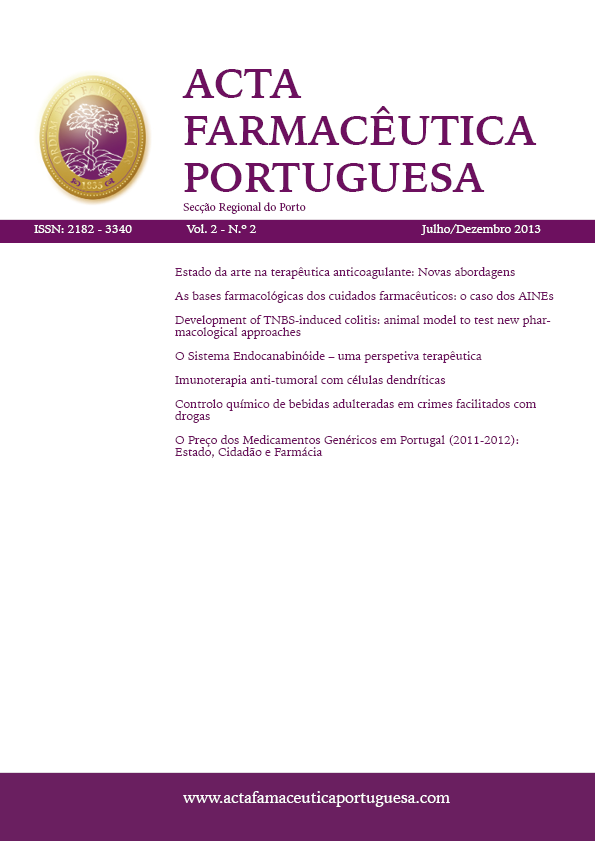Imunoterapia anti-tumoral com células dendríticas
Abstract
Dendritic cells (DCs) are professional antigen-presenting cells, which display an extraordinary capacity to induce and regulate T-cell responses. Because of their immunoregulatory capacities and because very small numbers of activated DCs are highly efficient in generating immune responses against antigens, DCs have been extensively used in clinical trials in order to elicit or amplify immune responses against cancer. While clinical trials provide evidence that dendritic cells vaccines are safe and elicit immunological responses in most patients, few complete tumor remissions have been reported. To improve the clinical efficacy, it is mandatory to design novel and improved strategies that can boost adaptive immunity to cancer helping to overcome regulatory T cells and allowing the breakdown of the immunosuppressive tumor microenvironment. The association of DCs vaccines with conventional chemo- and radiotherapy protocols could enhance DCs activation and antigen cross-presentation, selectively eliminating immunosuppressive cells, thus reverting the immunosuppression state caused by cancer, suggesting that relevant chemoimmunotherapy associa- tions could fully exploit DC capacity to trigger anticancer responses.
References
Goldsby RA, Kindt TJ, Osborne BA. Kuby Im- munology. 6a Ed. New York: W. H. Freeman and Company. p. 38-40, 2007.
flammatory signaling in innate Immune defen-
ses. Clin Microbiol Rev. 2009; 22(2):240-273.
Brussel IV, Berneman ZN, Cools N. Optimizing dendritic cell-based immunotherapy: tackling the complexity of different arms of the immune
system. Mediat Inflamm. 2012; 2012:1-14.
Boudreau JE, et al. Engineering dendritic cells to enhance cancer immunotherapy. Mol Thera-
py. 2011; 19(5):841-853.
Koido S, et al. Current Immunotherapeutic Ap-
proaches in Pancreatic Cancer. Clin Dev Immu-
nol. 2011; 2011:1-15.
Borghaei H, Smith MR, Campbell KS. Immu-
notherapy of cancer. Eur J Pharmacol. 2009;
:41-54.
Sabado RL, Bhardwaj N. Directing dendritic
cell immunotherapy towards successful cancer
treatment. Immunotherapy. 2010; 2(1):37-56. 14. Zhu J, Paul WE. Peripheral CD4+ T-cell diffe- rentiation regulated by networks of cytokines and transcription factors. Immunol Rev. 2010;
(1):247-262.
Amedei A, et al. Novel immunotherapeutic
strategies of gastric cancer treatment. J Biomed
Biotechnol. 2011; 2011:1-17.
Nicolette CA, et al. Dendritic cells for active
immunotherapy: optimizing design and manu- facture in order to develop commercially and clinically viable products. Vaccine. 2007; 25:47-
Neves BMR. Modulação das células dendríticas
por estímulos alergénicos e infeciosos. Tese de Doutoramento em farmácia, na especialidade
de biologia celular e molecular. Faculdade de
Farmácia da Universidade de Coimbra. Coim- 60.
bra: Universidade de Coimbra. p. 1-61, 2010.
Paczesny S, et al. Dendritic cells as vectors for immunotherapy of cancer. Semin Cancer Biolo-
gy. 2003; 13:439-447
Schuler G. Dendritic cells in cancer immuno-
therapy. Eur J Immunol. 2010; 40:2123-2130.
Jähnisch H, et al. Dendritic cell-cased immuno- therapy for prostate cancer. Clin Dev Immunol.
; 2010:1-8.
Kalinski P. Dendritic cells in immunotherapy of
established cancer: roles of signals 1, 2, 3 and 4.
Curr Opin Inv Drugs 2009; 10(6):526-535.
Steinman RM, Banchereau J. Taking dendritic
cell into medicine. Nature. 2007; 449:419-426.
Mogensen TH. Pathogen recognition and in-
Turnis ME, Rooney CM. Enhancement of den- dritic cells as vaccines for cancer. Immunothe- rapy. 2010; 2(6):847-862.
Palucka K, et al. Dendritic cells: are they clini- cally relevant?. Cancer J. 2010; 16(4):318-324.
Apetoh L, et al. Harnessing dendritic cells in cancer. Semin Immunol. 2011; 23:42-49.
Dubsky P, et al. IL-15-induced human DC effi- ciently prime melanoma-specific naive CD8+ T cells to differentiate into CTL. Eur J Immunol. 2007; 37:1678-1690.
Shurin MR, et al. Genetically modified dendritic cells in cancer immunotherapy: a better tomor- row?. Exp Opin Biol Ther. 2010; 10(11):1539- 1553.
Lapteva N, et al. Enhanced activation of hu- man dendritic cells by inducible CD40 and Toll-like receptor-4 ligation. Cancer Res. 2007; 67(21):10528-10537.
Wiethe C, et al. Enhanced effector and memory CTL responses generated by incorporation of receptor activator of NF-kB (RANK)/RANK li- gand costimulatory molecules into dendritic cell immunogens expressing a human tumor – specific antigen. J Immunol. 2003; 171(8):4121- 4130.
Park D, et al. An essential role for Akt1 in den- dritic cell function and tumor immunotherapy. Nat Biotechnol. 2006; 24(12):1581-1590.
Matsushita N, et al. Targeting MARCO can lead to enhanced dendritic cell motility and anti- -melanoma activity. Cancer Immunol Immuno- ther. 2010; 59(6):875-884.
Hong B, et al. Human SOCS1 controls immu- nostimulatory activity of monocyte-derived dendritic cells. Cancer Res. 2009; 69(20):8076- 8084.
Breckpot K, et al. Attenuated expression of A20 markedly increases the efficacy of double-stran- ded RNA-activated dendritic cells as an anti- -cancer vaccine. J Immunol. 2009; 182(2):860- 870.
Palucka K, et al. Dendritic cells and immunity against cancer. J Internal Med. 2010; 269:64-73.
Ramakrishnan R, et al. Chemotherapy enhan- ces tumor cell susceptibility to CTL-mediated killing during cancer immunotherapy in mice. J
Clin Inv. 2010; 120(4):1111-1124.
Wang Z, et al. Pancreatic cancer: understanding
and overcoming chemoresistence. Nat Rev
Gastroenterol Hepatol. 2011; 8(1):27-33.
Kirkwood JM, et al. Immunotherapy of cancer
in 2012. Cancer J Clin. 2012; 62(5):309-335.
Lee WC, et al. Vaccination of advanced hepato- cellular carcinoma patients with tumor lysate- -pulsed dendritic cells: a clinical trial. J Immu-
nother. 2005; 28(5):496-504.
Zerbini A, et al. Radiofrequency thermal abla-
tion of hepatocellular carcinoma liver nodules can active and enhance tumor-specific T-cell
Imunoterapia anti-tumoral com células dendríticas 59 responses. Cancer Res. 2006; 66(2):1139-1146.
Kantoff PW, et al. Sipuleucel-T immunotherapy for castration-resistant prostate cancer. J Med. 2010; 363(5):411-422.
Takahara A, et al. Gemcitabine enhances Wil- ms’ tumor gene WT1 expression and sensiti- zes human pancreatic cancer cells with WT1- -specific T-cell-mediated antitumor immune response. Cancer Immunol Immunother. 2011; 60(9):1289-1297.
Kono K, et al. Dendritic cells pulsed with HER- 2/neu-derived peptides can induce specific T- -cell responses in patients with gastric cancer. Clin Cancer Res. 2002; 8(11):3394-3400.
Czerniecki BJ, et al. Targeting HER-2/neu in ear- ly breast cancer development using dendritic cells with staged interleukin-12 burst secretion. Cancer Res. 2007; 67(4):1842-1852.
Dohnal AM, et al. Phase 1 study of tumor Ag- -loaded IL-12 secreting semi-mature DC for treatment of pediatric cancer. Cytotherapy. 2007; 9(8):755-770.


